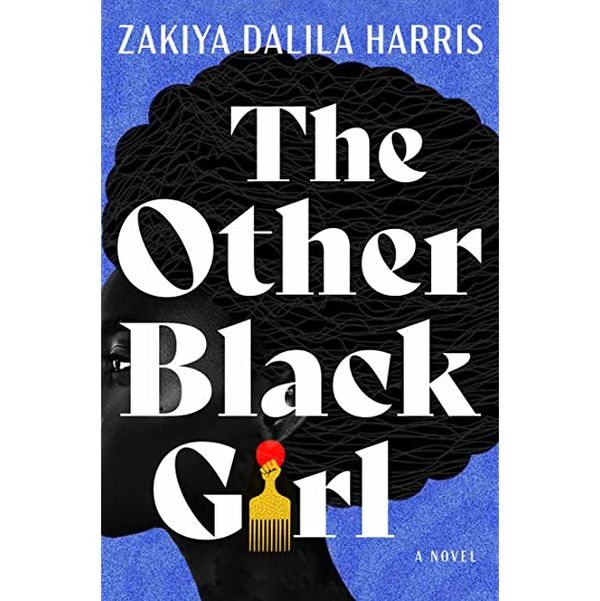
I wrote this passage of my debut novel, The Other Black Girl, not long after I left publishing, and many of my own experiences as an editorial assistant were still very much alive in my head. While writing Nella’s time at Wagner Books, it was important for me to convey what it’s like to be a young person working in an entry-level publishing position. It can be challenging in many ways: The pay is nearly impossible to live off of in New York City. You’re in a job that requires you to work with (and sometimes, manage) an array of personalities and expectations, and also to perform vital but menial tasks that often go unnoticed.
Then there’s the question of when, or if, a promotion will ever come … and perhaps the most dreaded question of all: Is this worth it?
For a lot of people, it is. But what if it’s not just the aforementioned parts of the job that get to you? What if there’s another part that reminds you every day that you’re the only Black person there, or one of just a couple of Black people? It makes you wonder. It feels stifling. And when other co-workers don’t feel as outraged by it as you do, it weighs you down like a ton of bricks. This passage is about that burden. I wanted to explore how it feels for Nella, who doubly feels like she’s at the bottom of the hierarchy — both because of her assistant position at Wagner and because of her identity as a Black woman.
I wanted to explore how this heaviness is exacerbated by the fact that Nella feels somewhat disillusioned by the publishing industry itself. Before becoming an editorial assistant, Nella had idealistic notions of what working in books meant. She knew that books by and for Black people existed; she has read many of them. She just didn’t know how white it was behind-the-scenes. To now be in this prestigious world of highly educated people, only to realize that hardly anyone knows how to even talk about their diversity problem, is laughably disturbing to her.
This scene is satire; none of my former publishing colleagues suggested “left-handedness” qualified as a diverse attribute (although as a left-handed person myself, I will say it can be quite hard out there for us). But there were questions and passing comments that deflected from the issue of diversity, and these kinds of questions aren’t just limited to the world of publishing. They’re everywhere.
I hope this passage makes you think about what an inclusive workplace and a meaningful conversation about diversity should actually look like. And I hope you enjoy it!
Vera was right. There was something in the water at Wagner. But Vera had had a hand in that. She and pretty much all of the higher-ups at Wagner who earned livable incomes—they were all messing with the water, making it difficult and sometimes impossible for smaller fish like Nella to survive. Lurking beneath many of the friendly seeming meetings was an environment of pettiness and power plays; cold shoulders and closed-door conversations.
The most fascinating part was that they all thought everyone else was crazy. At least, that’s what Yang, the girl who’d been assisting Maisy when Nella had first started at Wagner, had intimated to her. Yang had taken on the noble task of not only training her on editorial procedures, but also giving her the scoop about all of her new coworkers—whom to watch out for at holiday parties, whom to avoid in the elevator, whom to get coffee with. All the important intel. Yang had been an incredibly helpful guide, and as a first-generation Chinese American, she’d also been the only other POC Nella had ever gotten to work with at Wagner. Together, they made cracks about how hard it must be for everyone to tell them apart and rolled their eyes at the higher-ups constantly walking outsiders through their side of the office—purposely, they half-joked, to showcase the company’s diversity.
It all came to an end six months later, when Yang quit to go get her PhD. Three days after Yang’s last day at Wagner, another shooting of yet another unarmed Black man—this time, an elderly one—went viral. He had been pulled over by a white police officer hours before sunrise in rural North Carolina. Minutes later, he was dead, and hours later, the world was on fire. Numerous reports said he’d been reaching to turn up his hearing aid. One day after Nella watched Jesse Watson’s livid response to the shooting blow up on Twitter, Richard Wagner sent out a company-wide email announcing an upcoming series of Diversity Town Halls.
Very rarely did the editor in chief of Wagner Books send emails to his employees; he either popped into your office unexpectedly or sent you a note handwritten in impeccable cursive. The very existence of this email was thrilling, and its contents were so promising that Nella had printed out the email and thumbtacked it up in her cube. The news of the shooting had outraged the country and it had particularly outraged her, too—not only because the man had been hard of hearing and in his seventies, but also because he’d borne a subtle resemblance to a grandfather she’d never met. It was comforting to know, then, that all Wagner employees had received a directive to start talking to each other about the major elephant in the room.
But there was just one problem: No one really knew what the elephant was. Or where the elephant was. Or if there was even an elephant at all. The definition of “diversity at Wagner” managed to mystify all of Nella’s colleagues, and Natalie from HR and the British moderator she’d brought in as a “neutral party” spent the first hour of the first town hall trying to pinpoint what they were really supposed to be talking about. “Do we mean diverse employees or diverse books?” asked Alexander, one of Wagner’s most literal editors. “Or do we mean diverse authors?” “Didn’t we publish this book by that Black writer just last year?” others asked. And so on.
Their confusion was understandable enough, and Nella did her best to rein everyone back in toward the task at hand with her own small “objective” observations. But she couldn’t bring herself to say that maybe higher-level employees shouldn’t primarily hire people with Ivy League degrees or personal connections, because her own résumé had been boosted by an editor friend of one of her professors at the University of Virginia. And the zinger she really wanted to deliver—Yes, we just published “that Black writer” last year, but that writer, along with the last six Black people we’ve published here at Wagner, was not a Black American, he was from an African country, and while that’s definitely an example of diversity, it’s also really not—wouldn’t work, either. It would only unleash a whole new slew of gradations that Nella didn’t even feel comfortable grappling with on her own yet, let alone with her white employers.
The second hour of the “meeting” was filled with clumsy role play and even clumsier word association games, and naturally things got worse. When Nella offered up the acronym “BIPOC” as a term she associated with “diversity,” her coworkers ooh-yeahed … and then offered their own examples of “diversity”: “left-handedness,” “nearsightedness,” and “dyslexia.” Only when someone volunteered the word “non-millennial” did Nella realize that a return to her own concern about the treatment of Black people both inside and outside of the literary sphere would be highly unlikely. And just like that, faster than it took to utter the words, “what about ageism?” the moderator was bowing her head and lauding everyone—the one hundred or so people in the room, all white save for Nella—for being so open.
Relieved at the prospect of watercooler debriefings, her colleagues had hustled out of the conference room faster than they’d exited any sexual harassment education seminar. And everybody had seemed far more perplexed leaving the town hall than they’d been going in.
Nella was, too. But for different reasons. Her coworkers could publish books about Bitcoin and Middle Eastern conflicts and black holes, but most of them couldn’t understand why it was so important to have a more diverse publishing house. It didn’t surprise Nella, then, that the next non-mandatory Diversity Town Hall had half as many attendees as the first. The following, even fewer. By the time the fourth meeting rolled around, its attendees were just Nella and a blue-eyed publicity assistant whose name Nella no longer remembered, because she was no longer with the company. Even Natalie in HR had stopped attending due to “scheduling conflicts.”
“Maybe we should offer donuts or something, to get more people to come?” the blue-eyed assistant had meekly suggested, and in an uncharacteristically public gesture of frustration, Nella had ripped up the latest think piece she’d planned to share with everybody and stormed out of the room.
Heat still brushed Nella’s cheeks whenever she remembered this public display of weakness. Being the only Black girl in the room wasn’t so hard a gig most of the time. She’d slowly befriended every other individual at Wagner who worked as an assistant in any capacity, and the other people of color who worked at the front desk and in the mailroom knew her by name. But it wasn’t the same as having a “work wife” who really understood her. She craved the ability to walk across the hallway, vomit out all of her feelings about a racially insensitive fictional character, and return to her desk, good as new.
Nella had grabbed one of Colin Franklin’s twenty-page contracts from the printer and was flipping through it, thinking about just how many feelings were churning around her insides, when she walked straight into her newest cube neighbor.
Copyright © 2021 by Dalila Zakiya Harris. From the forthcoming book THE OTHER BLACK GIRL by Dalila Zakiya Harris to be published by Atria Books, a Division of Simon & Schuster, Inc. Printed by permission.
Every product is independently selected by our editors. Things you buy through our links may earn us a commission.





